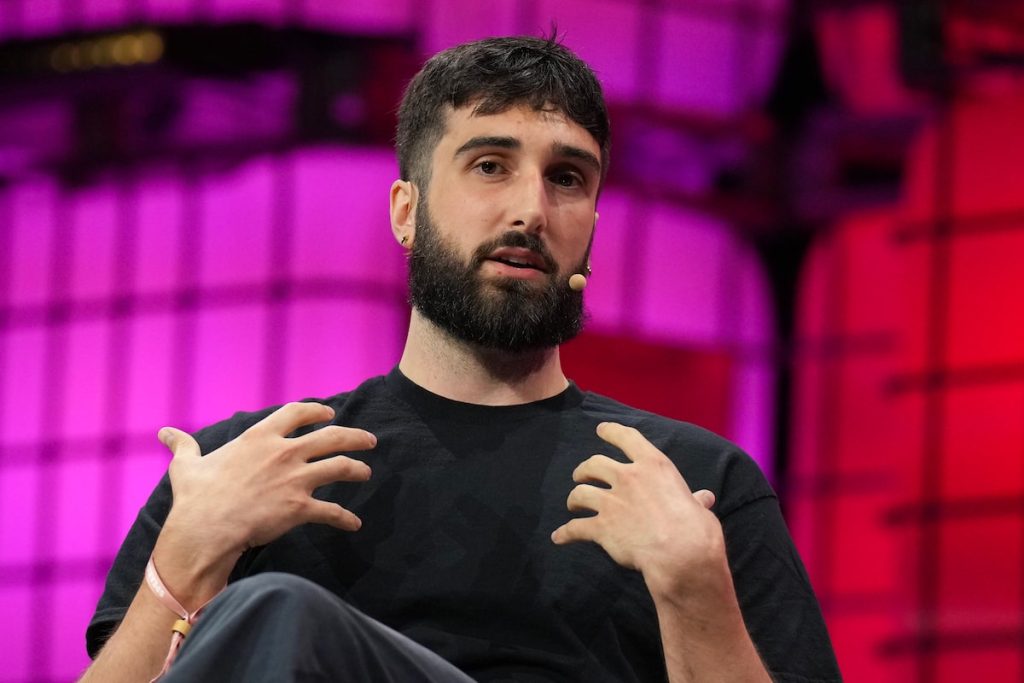Aidan Gomez, co-founder of Cohere, in June. Cohere and the federal government have signed a memorandum of understanding to bring AI to the public service. This agreement says Cohere would still have to compete against other companies for Ottawa’s business.Chris Young/The Canadian Press
The federal government is working with Toronto-based AI startup Cohere Inc. to look for ways to deploy artificial intelligence across its operations.
Cohere and Ottawa have signed a memorandum of understanding, or MOU, to bring AI to the public service. An MOU is not a legally binding contract, and neither party has disclosed any specific projects under way. Cohere would still have to compete for government business.
Opinion: Ottawa’s AI push must translate into savings
But the agreement highlights Cohere’s desire to sell its tools to the public sector – and the government’s desire to use AI to boost efficiency while procuring products and services from domestic companies. Prime Minister Mark Carney has also made AI adoption a priority.
“This is the beginning, hopefully, of our technology being rolled out quite broadly within the Canadian government,” Cohere co-founder and chief executive officer Aidan Gomez said in an interview Friday. Ottawa is not a substantial customer today, he said, though Cohere is working with public-sector clients elsewhere in the world.
The federal government has shown Cohere a lot of love lately. Founded in 2019, the company builds large language models, or LLMs, and has focused its products on businesses and government clients with high security and privacy needs. Evan Solomon, the Minister of AI and Digital Innovation, regularly touts the company.
Canada’s first AI Minister Evan Solomon on his plan to scale up the industry
‘Potentially very dangerous’: Nobel winner Hinton wants AI minister to regulate the tech
Last year, the government provided Cohere with $240-million for its computer processing needs through a federal program. It is the only Canadian company building foundational AI models to compete with OpenAI, Anthropic, Google.com Inc. and a handful of other well-funded developers.
There are a few factors motivating the latest agreement with the government. Mr. Carney believes AI can improve government productivity and singled out the technology in his mandate letter to MPs. He campaigned on a plan to cut back on operational spending, and ministers have been instructed to find cost savings.
Countries are also racing to secure a leadership position in AI, offering support to the industry to maintain control over the technology and lessen their dependence on foreign companies.
“This is a globally competitive market, and we have competitors talking about dominance,” Mr. Solomon said. “This sends a signal externally, but also internally to government, that when we develop these contracts for these projects, Cohere is at the front of the line.”
He added that, even as the government reviews spending, AI adoption is not an effort to slash jobs. “The focus on how all AI is going to do is take a job – the same conversation was had around the bank machine and the computer,” he said. “It is a powerful tool, and the goal is to deliver better service to people.”
Joël Lightbound, the Minister of Government Transformation, Public Works and Procurement, has said the government plans to reduce the size of the public service through attrition.
Is AI dulling critical-thinking skills? As tech companies court students, educators weigh the risks
Cohere opened wider access to its North platform this month, which is powered by its AI models and can draw on a client’s private data to assist with all kinds of office work, such as drafting documents and other materials. Customers can also use North to build custom AI agents to handle mundane tasks. Both Royal Bank of Canada and Bell Canada have signed on.
Mr. Gomez said North is ideal for the public sector because of its privacy and security features. “No citizen data has any risk of being sent abroad or put into the hands of foreign companies,” he said.
The company has ideas about how and where its technology can improve service quality and reduce repetitive tasks within the public service, he said, but declined to elaborate.
Cohere signed a similar MOU with the government of the United Kingdom in June.

